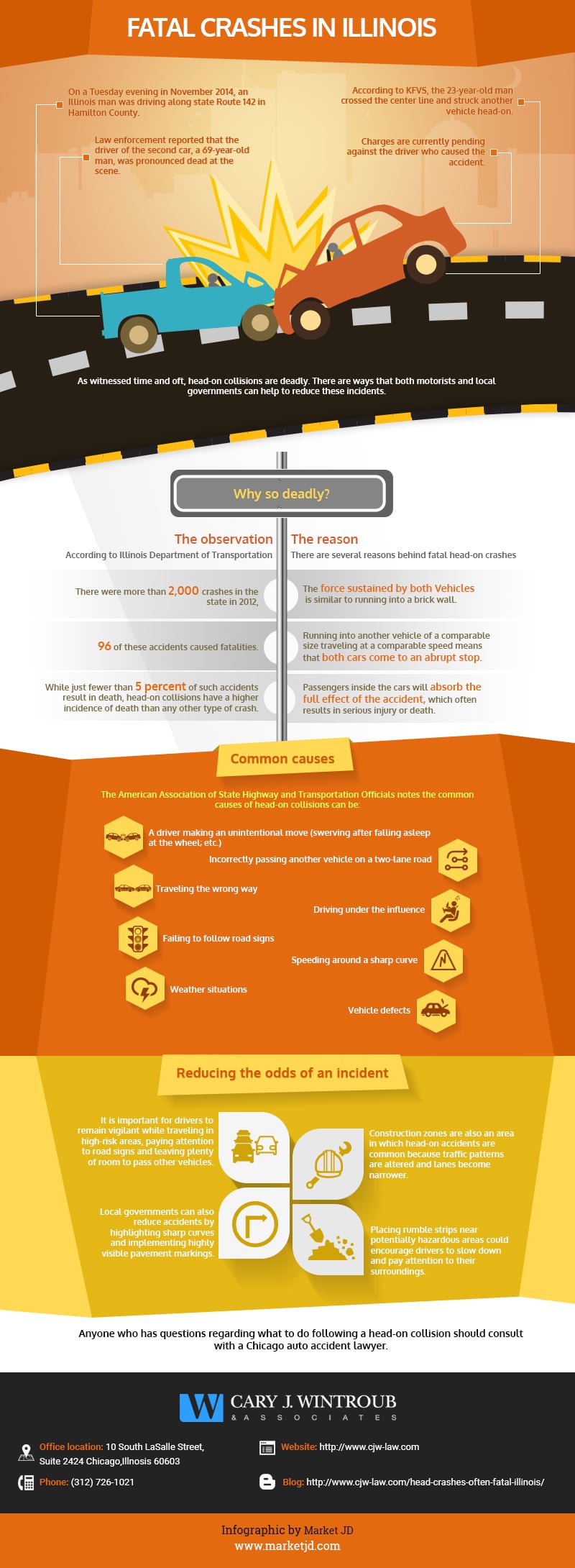Head-on crashes are often fatal in Illinois
On a Tuesday evening in November 2014, an Illinois man was driving along state Route 142 in Hamilton County. According to KFVS, the 23-year-old man crossed the center line and struck another vehicle head-on. Law enforcement reported that the driver of the second car, a 69-year-old man, was pronounced dead at the scene. Charges are currently pending against the driver who caused the accident.
(article continues below infographic)
As a Chicago auto accident lawyer may have seen, head-on collisions are often deadly. There are ways that both motorists and local governments can help to reduce these incidents.
Why so deadly?
According to Illinois Department of Transportation, there were more than 2,000 head-on crashes in the state in 2012, 96 of which caused fatalities. While just under 5 percent of such accidents result in death, head-on collisions have a higher incidence of death than any other type of crash.
The reason these crashes tend to be so severe is because of the force that both vehicles sustain. Similar to running into a brick wall, running into another vehicle of a comparable size traveling at a comparable speed means that both cars come to an abrupt stop. Therefore, passengers inside the cars will absorb the full effect of the accident, which often results in serious injury or death.
Common causes
As a Chicago auto accident lawyer knows, there are many reasons that a head-on crash will occur. The American Association of State Highway and Transportation Officials note that such accidents are most likely to occur when a driver makes some type of unintentional move, such as swerving after falling asleep at the wheel or as a result of distracted driving.
Other common causes include the following:
- Incorrectly passing another vehicle on a two-lane road
- Traveling the wrong way
- Driving under the influence
- Failing to follow road signs
Speeding around a sharp curve is often associated with these fatal accidents. The organization reports that weather situations and vehicle defects can also play a role.
Reducing the odds of an incident
The AASHTO found that the majority of head-on accidents occur on two-lane roads. It is important for drivers to remain vigilant while traveling in these high-risk areas, paying attention to road signs and leaving plenty of room to pass other vehicles. Construction zones are also an area in which head-on accidents are common because traffic patterns are altered and lanes become narrower.
In addition to drivers exercising caution, local governments can also reduce accidents by highlighting sharp curves and implementing highly visible pavement markings. Additionally, placing rumble strips near potentially hazardous areas could encourage drivers to slow down and pay attention to their surroundings.
Anyone who has questions regarding what to do following a head-on collision should consult with a Chicago auto accident lawyer.




